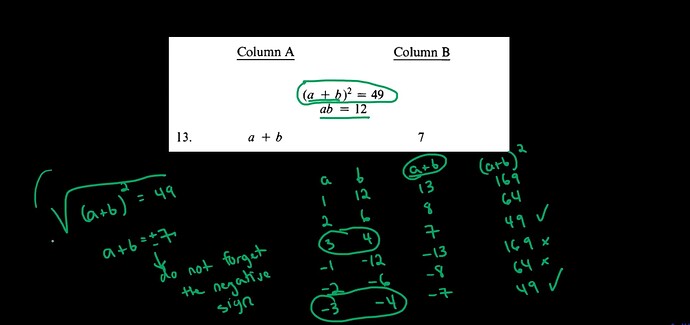In the one month plan Greg mentions the GRE always considers the positive function of a root and never the negative. This was reiterated in one of the Quant flashcards, copy pasting the sentence here "Fun fact: On the GRE Root49 equals ONLY 7, not +/- 7. The GRE considers ONLY the positive root.
However, in a question Greg solved in his one month plan, “Week 1 - Day 6 Arithmetic and Algebra session 11” at about the 50th minute mark (screenshot also attached), he tells us to not forget that root49 could be +/- 7 and that’s where we could lose marks. So I’m a little confused about when to consider the negative of a root as well.
If x^2 = 49, x = \pm 7
However, \sqrt{49} = 7
Does that help?
Yes that makes sense! However in the screenshot above, we were going from root49 = +/- 7, instead of 7^2 = 49 hence 7 could be +/- 7.
root(a+b)^2 = (a+b) which is fine, that makes sense, but we also had to root49 = +/- 7, but that goes against the GRE rule of roots.
Not sure where my gap in understanding is.
Depends on how you word it. In fact, the below is not always true:
\sqrt{(a + b)^2} = (a + b)
Ah. I think I am even more confused now  So in my original doubt, why is that discrepancy there? If you could dumb it down for me, that would be great.
So in my original doubt, why is that discrepancy there? If you could dumb it down for me, that would be great.
It boils down to this:
In x^2 = 49, can you put a negative value of x? Yes, because the square of a negative number is positive.
However, on the GRE, square roots are always positive. That’s why \sqrt{49} has to be 7.
Simple in GRE ROOT(x2) = Mod(x) not x , this is what it means root gives positive output. but do not confuse that here for example, Root(x2) = 3 , that does not mean X= 3 is only solution, and X = -3 wont be correct, that too will be correct, because that will also satisfy the equation. Feeding X = -3 also giving root value as 3 so that is possible, just remember this ROOT(x*2) = Mod(x) not x.
